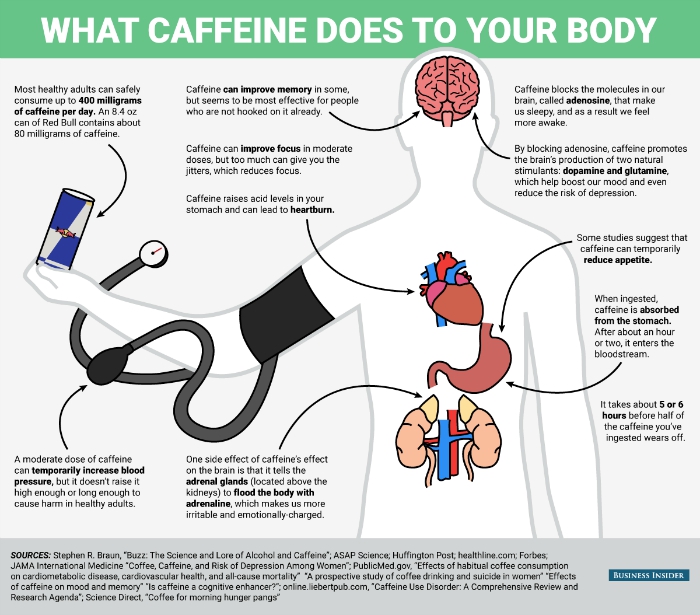
The FDA recommends no more than 400 mg of caffeine in a day for healthy adults. While caffeine has many perks, too much can lead to adverse side effects such as Note that most energy drinks are 12-16oz, which means more caffeine. The amount of caffeine in coffee and energy drinks is comparable by volume (depending on how strong you brew your coffee). So, which has more caffeine: coffee or energy drinks?Īn 8oz cup of black coffee contains 85-120 milligrams of caffeine.Īn 8.4oz can of Red Bull contains 80 mg of caffeine. Caffeine is the primary draw for a cup of joe or any popular energy drink. Healthcare professionals should always check this website for the most recently updated information.Let’s start at the top.

#5 hour energy caffeine vs coffee professional#
Patients must always consult a qualified health care professional regarding their diagnosis and treatment. It is not intended or recommended for patients or other laypersons or as a substitute for medical advice, diagnosis, or treatment. May not be reproduced in any form without express written permission.ĭisclaimer: The content on this website is provided as general education for medical professionals. Related Pages Caffeine and mental health How much caffeine is too much? Should we recommend decaffeinated coffee? Caffeine contentĬopyright 2016, 2017, Rajnish Mago, MD. Note: 5-Hour Energy also comes in a decaf version, though this is not popular. I think we need to raise awareness among our patients that the original 5-Hour Energy drink contains a lot of caffeine. I had a patient who became addicted to 5-Hour Energy® drinks and would drink about five of them a day and then, not surprisingly, needed a high dose of quetiapine at night to sleep. Well, guess what–a cup of the “leading premium coffee” contains a LOT of caffeine. It simply states that it contains caffeine “comparable to a cup of the leading premium coffee”. Also, the label on 5-Hour Energy® drinks does not state how much caffeine there is in each bottle. The small can, which is more popular, contains 80 mg of caffeine. Monster Energy comes in a 16 ounce can that contains 160 mg of caffeine.īut for the very popular 5-Hour Energy® drinks, in my experience, the users often don’t even think of them as containing caffeine. Red Bull comes in a small (8.4 ounces) and large (20 ounces) cans. The caffeine content of various “energy” drinks is shown in the table below. Is it just me who finds the term “energy” drinks particularly upsetting? Among these, the product lines that are most popular in the US are Red Bull ®, Monster Energy ®, and 5-Hour Energy ®. So-called “energy” drinks have become incredibly popular, especially among young persons but also among older persons.

The relationship between COVID-19 and mental disorders (and what we should do about it).Helping persons with OCD deal with the coronavirus pandemic.Could psychotropic medications impair the immune response to coronavirus?.What mental health clinicians can do about the coronavirus.Important recommendations regarding sex and coronavirus.A primer on tests for identifying 2019 novel coronavirus (SARS-CoV-2) infection.A simple guide to the COVID-19 vaccines.“Telewear”: What to wear when seeing patients virtually.Telepsychiatry: Expert Interview with Peter Yellowlees, MD.Telepsychiatry: Reimbursement, billing, and coding.Telepsychiatry: Comparison of platforms.Telepsychiatry: Your questions answered.


 0 kommentar(er)
0 kommentar(er)
